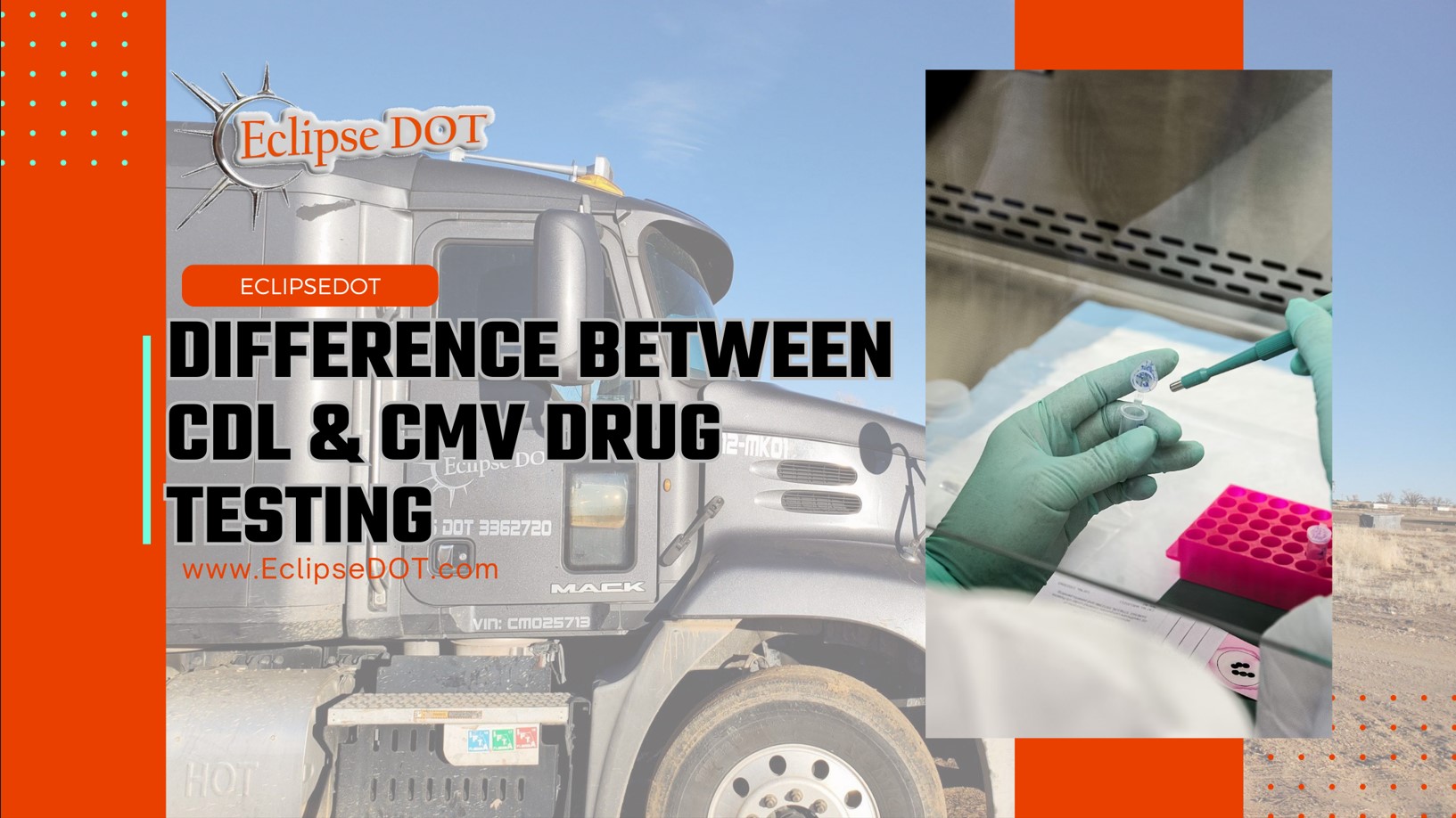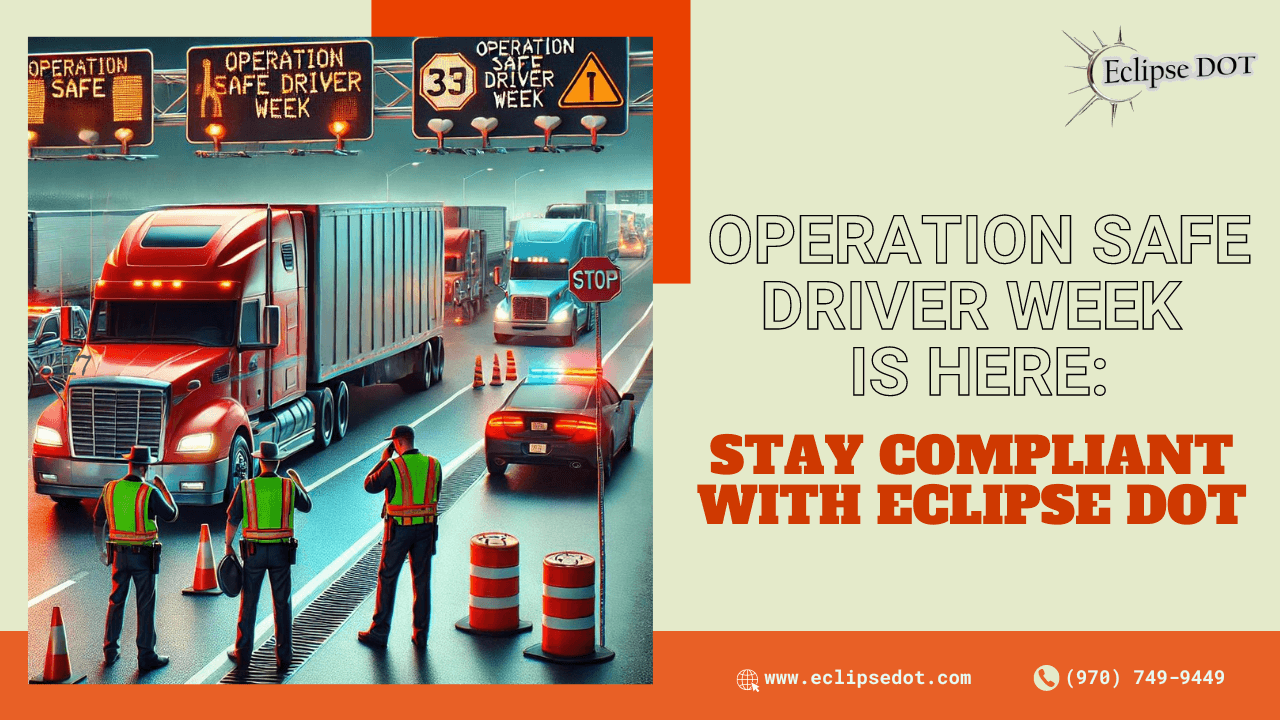A Guide for Commercial Drivers
In the hustle and bustle of the commercial driving world, safety isn’t just important—it’s the top priority. When a driver hits the road in a big rig, they’re taking on the crucial task of ensuring safety for themselves, their cargo, and everyone else on the road. Drug testing is a key player in maintaining this safety, acting as a crucial tool to spot and discourage substance abuse among commercial drivers.
But, in the maze of rules and jargon, it’s vital for drivers and everyone involved to grasp the difference between CDL and CMV drug testing. Let’s take a journey to unravel these complexities and shine a light on the significant distinctions.
Understanding CDL Drug Testing
Alright, let’s break it down. CDL drug testing is a big deal, thanks to the Department of Transportation (DOT). It’s not just a box to check for regulations; it’s a solid system in place to keep everyone safe in the commercial driving world. The DOT rules lay out exactly what substances they’re checking for in CDL drug tests. They’re not missing a beat—they’re looking for the usual suspects like marijuana, cocaine, amphetamines, opiates, and phencyclidine (PCP).
Why all this fuss? They want to make sure drivers are clear of any substances that could mess with their ability to handle a big rig safely. It’s not just paperwork; it’s a serious effort to keep our roads safe and sound.
Now, let’s dig into the important details of CDL drug testing. The Department of Transportation (DOT) doesn’t just stop at listing the substances they’re checking; they’ve got the whole plan for how the testing works. From collecting the sample to the fancy lab analysis, every step is laid out in detail. Why? To make sure things stay the same and are fair for everyone.
But here’s the deal—fail a CDL drug test, and it’s not easy. The consequences are serious and can mess up a driver’s career and life. We’re talking about getting suspended right away or even losing that CDL. And finding a job in the industry might become a real challenge. So, it’s not just about following the rules; it’s about keeping your career on the right track in the world of commercial driving.
An Overview of CMV Drug Testing
You’ve got your regular CDL drug testing, but CMV drug testing goes a bit broader. It covers not just CDL holders but also anyone driving vehicles under the Federal Motor Carrier Safety Administration (FMCSA) rules.
So, why the extra attention? Well, the FMCSA wants to make sure everyone on the road is safe, not just the big-rig drivers. They’re looking out for all commercial drivers and the public. It’s like a big safety net for everyone involved in the transportation game. Keep it simple, keep it safe!
Just like CDL drug testing, CMV drug testing follows strict rules made by the DOT and FMCSA. These rules cover everything from how tests are done to the standards labs must meet. This helps make sure the testing is consistent and trustworthy. But it’s important to know that CDL drug testing mainly looks at drivers with commercial driver’s licenses. On the other hand, CMV drug testing includes a wider range of commercial vehicles and drivers. Because of this, it’s important to understand the specific rules and needs for CMV drug testing.
Key Differences Between CDL and CMV Drug Testing
The difference between CDL and CMV drug testing goes beyond just what they cover. It’s not just about what they test for, but also how they are regulated and the procedures they follow. Both are designed to find and discourage drug use among truck drivers, but they do it in slightly different ways.
CDL drug testing is mainly for people with commercial driver’s licenses. On the other hand, CMV drug testing is for a wider range of commercial vehicles and drivers, no matter if they have a special license or not. Understanding this helps make sure the right testing is done for the right drivers and vehicles.
Regulations and Procedures
When it comes to rules, CDL drug testing follows the guidelines set by the Department of Transportation (DOT), specifically outlined in Part 382 of Title 49 of the Code of Federal Regulations (CFR). These rules detail everything from how drug testing programs should be carried out to the collection of samples, lab analysis, and what happens if someone doesn’t follow the rules.
In contrast, CMV drug testing has a mix of DOT and FMCSA regulations to follow. This combination reflects the wider range of vehicles and drivers that need testing. So, while CDL testing has its own set of rules, CMV testing combines rules from both the Department of Transportation and the Federal Motor Carrier Safety Administration. It’s like having a broader set of guidelines to make sure all kinds of vehicles and drivers are covered.
Testing Methods and Consequences
When it comes to how they test for drugs, both CDL and CMV drug testing stick to set rules to make sure the results are reliable. They use standard procedures to keep things consistent and accurate. But there are some tiny differences because of the specific rules they follow.
For instance, both tests might use pee samples to check for drugs. However, CMV drug testing can go a bit further and use other methods, like testing hair follicles. This extra step helps them detect drugs even better. So, while they both use similar protocols, CMV testing has a little extra trick up its sleeve to make sure it’s thorough.
Additionally, what happens if you fail a drug test can be different under CDL and CMV rules. This highlights how important it is to know the specific outcomes tied to each kind of test. Both could lead to losing the right to drive, either temporarily (suspension) or for good (revocation). But how harsh the punishment is can change based on the situation and the rules that apply in that case. Understanding these details helps drivers grasp the potential consequences and navigate the rules accordingly.
Importance of Compliance
Following the rules for CDL and CMV drug testing is more than just a legal requirement—it’s a crucial part of keeping our roads safe. When drivers and employers stick to these regulations, it shows they are dedicated to maintaining the highest levels of professionalism and responsibility. On the flip side, not following the rules can lead to serious consequences. This includes fines, penalties, legal troubles, and damage to one’s reputation. So, it’s not just about following the law; it’s about making sure everyone on the road stays safe and responsible.
Looking at real-life situations drives home how important it is to follow drug testing rules. Whether it’s a big accident making headlines or just regular checks on the road, not sticking to the rules can have immediate and widespread effects. To avoid these risks and create a safe environment in the transportation industry, it’s crucial for drivers and employers to make compliance a top priority. That means investing in strong drug testing programs to keep everyone safe on the road.
Ensuring Fairness and Accuracy
In drug testing, it’s really important to be fair and get the right results. The outcomes can have big effects, so it’s crucial to do things right. Drug testing labs are key players in making sure everything is fair and accurate. They use the latest technologies and strict quality checks to keep the test results trustworthy. From collecting samples to doing the analysis, every part of the testing process is closely watched and recorded. This helps keep things clear and makes sure everyone is accountable for the results.
Even though drug testing methods are getting better, their main aim remains unchanged: finding and preventing drug use among truck drivers. But we need to admit that no testing method is perfect, and there can be problems in some situations. Things like false positives or people messing with the samples can make the test results less reliable. That’s why it’s really important to have strong quality checks and protocols in place to make sure the drug testing is solid and trustworthy.
Even with the challenges, the main aim is still straightforward: to make sure drug testing is fair and accurate at the highest level. To achieve this, drug testing labs use the latest technologies, conduct strict quality checks, and create a culture where everything is clear, and everyone is responsible. By putting in these efforts, they make sure the drug testing programs are reliable and trusted. In the end, it’s not just about testing; it’s about keeping our roads and communities safe.
Conclusion
To sum it up, the difference between CDL and CMV drug testing is not just about words—it’s a big deal for keeping things safe and following the rules in the commercial driving world. When drivers and everyone involved know the details and outcomes tied to each type of testing, they can handle the rules better and reduce the risks that come with not following them. Understanding these distinctions is key to a smoother and safer ride in the commercial driving industry.
Thinking about why drug testing matters for road safety, let’s highlight how crucial it is to stick to the rules and be responsible. When we make safety a top priority, invest in strong drug testing programs, and create a culture where everyone takes responsibility, we’re making sure the transportation industry keeps its high standards of professionalism and honesty. Together, we’re working to make our roads safer for everyone, both now and in the years to come.
References
Federal Motor Carrier Safety Administration (FMCSA). (n.d.). Drug & Alcohol Testing. https://www.fmcsa.dot.gov/regulations/drug-alcohol-testing
Code of Federal Regulations (CFR) – Title 49, Part 382: Controlled Sub
Take control of safety and compliance – Navigate the roads with confidence. Explore the CDL VS CMV VS NON-DOT DRIVERS today and ensure a secure and responsible journey for you and your team. Stay informed, stay compliant – Your path to safety starts here! To learn more, visit RealDanGreer.com.
Discover our CDL & DOT Compliance articles for an exclusive trial at DOTDocs.com. Also, claim your FREE micro audit at THE ECLIPSE DOT MICRO AUDIT. Are you ready for streamlined operations? Dive in now!





